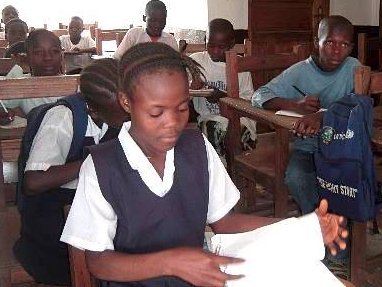
PTA and community follow-up training

In 2010 CARD Liberia signed a contract with the Norwegian Refugee Council for implementing follow-up projects in northern Liberia for the Norwegian Refugee Council. In the first half of 2010, 100 communities were mobilized and sensitized regarding the PTA training project and 141 teachers were trained. 129 teachers received their certificates.
Now these communities in Grand Cape Mount, Bomi and Gbarpolu Counties require additional support and training of their PTAs on ways to generate income to support their schools.
Training will include sharing information on successful initiatives, exploring innovative approaches of mobilizing resources and exchange visits to PTAs in other communities to share experiences and adopt best practices.
The main objectives are
- to create a spirit of team building, encourage community mobilization and instill a sense of self reliance within 100 PTAs through community/school gardening empowering them to sustain their primary schools.
- to support innovative avenues for income generating activities outside of farming by PTAs.
- to continually evaluate applications of new skills and techniques learned.
A PTA Empowerment Training workshop, relating to gardening and farming, will be held. It will focus on subjects like farming techniques, preparing nurseries, pest and disease control and seed multiplication. During the entire project CARD staff will work hand in hand with the farmers, ensuring that what was learned during the workshop is implemented on the field. This way the farmer's products are of good quality and quantity, linking them with the markets so they will get a fair price for their produce.
Soap making is another source of income. In rural areas of Liberia soap is an essential item in every household regardless of income level. Currently our the communities purchase their soap from surrounding areas incurring costs thus using limited resources that can be used to build their own communities.
CARD will train PTAs participants from all 100 communities in Small Business Management, giving them tools to build on efforts on seeking out innovative ways to support themselves. Areas to be covered during this training are ‘Business Idea’, ‘Are you the Rightful Person to Start a Business?’ and ‘Marketing, & Record Keeping’.
The 24 most committed PTA groups will be selected as pilot group where CARD will work intensely with the communities in production and marketing on a bigger scale than offered in the global training.
As of December 31st, 2010, this project was concluded. 100 communities received the global training and due to budget constraints only 45 communities received seeds, materials an tools.
Assessment
Mid February an assessment of the effectiveness of the project has been made. It was shown that the income generating activities are progressing well thus far and the overall involvement of the PTA’s in managing their community schools is gradually improving. This is a significant achievement for the communities.
Some highlights:
Maher community benefited from the soap making pilot project in Bomi County and it is involved in the following activities:
- Construction of three classrooms annex stick to mud and plastering, process ongoing
- Building material bought and carpenter's fees paid from the income generated from the proceeds of their soap production sale
Their immediate future plan is to cultivate plantain and banana farms in addition to production of soap
Yomo town community
- has built a soap production center
- bought cooking utensils for their community school
- compensated their volunteer teachers from the proceeds of their soap production sales
Their immediate future plan is to construct two class room annex to their community school.